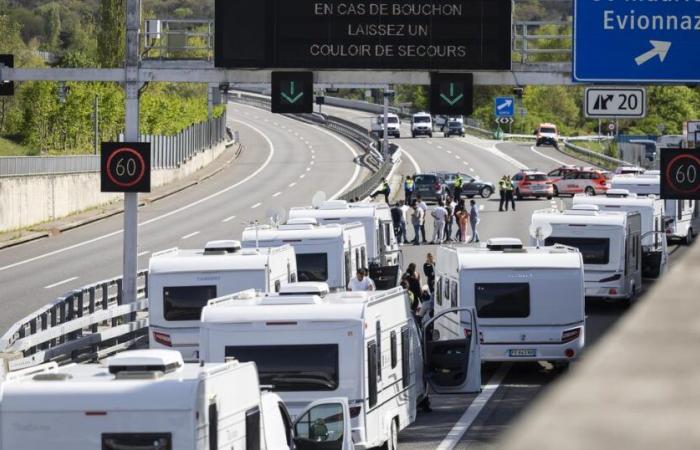The Confederation renounces to coordinate the creation of transit areas for foreign travel people. The disagreements between the cantons and Berne were right for a project, which has been considered essential since 2016, learned RTS.
Last Friday, the cantons were officially informed of the abandonment of the national planning project for transit areas intended for foreign Roma passing through Switzerland. In question: the opinions expressed by these same cantons in the context of the consultation were mainly critical.
This decision marks the end of a process started almost ten years ago, while the Federal Council underlined in 2016 the need for supraregional solutions to manage a cross -border phenomenon.
Currently, only seven transit areas exist in Switzerland, mainly in French -speaking Switzerland, as in Rennaz (Vaud), Martigny (Valais) or the sight of the Alps (Neuchâtel), the latter being a provisional site. It was precisely from this place that the caravans recently stopped by the Valais police on the A9 motorway.
>> Review on this subject the report of 7:30 p.m.:
Cost, distribution and regional tensions
Main obstacle that led to the failure of this national conception: funding. The cantons refused to bring the cost of new infrastructures alone and demanded federal participation, as is the case for the areas intended for Swiss travel people.
The distribution provided for by the plan has also aroused dissatisfaction. The project proposed to cut the country into seven regions, with a binding number of places to create in order to double the current capacity. This division was rejected by several cantons, notably in German -speaking Switzerland, Ticino and Graubünden. Even in French -speaking Switzerland, yet confronted with the most pressing needs, voices have been raised: Neuchâtel, for example, believed that he was too much in question in relation to the Lake Geneva.
Coordination intercantonale?
Result: the cantons will have to act on their side. There will be neither national directives nor centralized coordination, indicates the Federal Office of Culture (OFC), which has overseen the discussions. So will the cantons manage to coordinate? According to Jean-François Steiert, state councilor and president of the Swiss conference of cantonal directors in charge of regional planning, they already do.
“Some infrastructure already exists. Today, the canton of Friborg is coordinating with the canton of Vaud, the canton of Bern. We tried to find areas that are territorially in a coherence that exceeds the cantonal limits,” he explained Thursday in the RTS Forum program. For the Friborg socialist, “the wishes depend on the cantons” but “the vast majority of them praised the fact of advancing and coordinating”. According to him, the abandonment of the project originates from the withdrawal of the confederation of funding.
Legal obligations
The Confederation says, for its part, wanting to continue to seek solutions with the cantons on the basis of requests and individual projects with the cantons.
But the Federal Culture Office recalls that Switzerland has international obligations in this area. It is necessary to create more transit areas for these foreign travel people, especially to avoid more expensive illegal occupations, she points out. And also to reduce the pressure on parking spaces intended for yeniches and gypsy, which are recognized as national minorities.
Romain Bardet/Ther








